Yesterday, in the first part of Piers Morgan’s electrifying new book, he cast an acerbic eye over his ongoing war with Harry and Meghan. Today, the broadcaster launches a robust defence of traditional masculinity and argues that controversial influencer Andrew Tate might, in fact, have a point…
I didn’t think much of Adolescence, the dark, gritty and frankly boring British drama that everyone else greeted with hysterical acclaim and our prime minister said should be required viewing in every secondary school.
It’s not even that original, just an updated re-telling of the same downbeat story that has dominated culture throughout the woke years. Girls should be instinctively fearful of boys, whose primal beastliness is an inevitable and grave threat.
In this Netflix series about a 13-year-old boy who kills a schoolgirl after being radicalised by toxic masculinity, viewers are catapulted into a hostile teenage world of always-online boys with malevolent expectations of girls and hapless adults whose children have been hopelessly corrupted by influencers like Andrew Tate.
Protagonist Jamie stabs a female classmate for spurning his romantic advances and teasing him for being an ‘incel’ – a familiar online slur for young men who can’t attract women.
It’s not unusual for me to be bored stiff by a series that is hailed as a masterpiece or cynical about a work of fiction lauded for its clunky moralising of real-world social issues.
But the nauseating universal reverence for Adolescence was in a league of its own.
‘Netflix hit proves necessity of male role models,’ boomed the BBC News website.
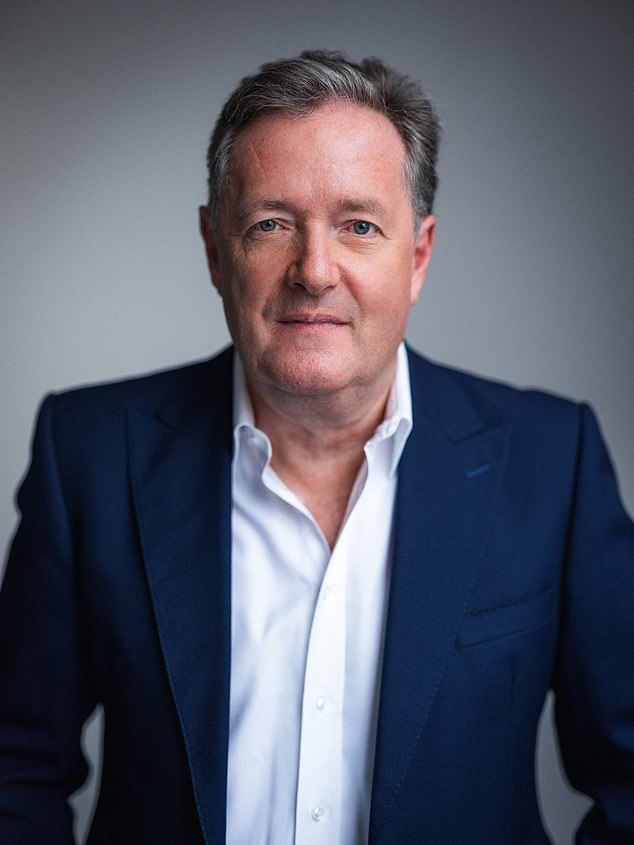
‘Wokeness sees men as undeserving champions who need to be knocked off their perch to make room for everybody else,’ writes Piers Morgan
‘How Adolescence is making Britain face up to toxic masculinity,’ gushed the Guardian. Keir Starmer praised the series in Parliament and spoke about ‘abhorrent violence’ that is ‘carried out by young men, influenced by what they see online’ as a crisis needing urgent attention.
He welcomed its creators to Downing Street while MPs convened a special committee to ask the writers of the series for insights into the warped minds of their imaginary characters. On my television show, psychologist Dr Jordan Peterson tore into the prime minister’s ‘posturing’ as ‘exactly what you’d expect from the progressive playbook. Double down on the incels instead of trying to figure out that it’s the result of 60 years of radically demoralising, quasi-feminist, dimwit hedonistic Leftist propaganda shovelled at them from primary school all the way through university!’
Conservative leader Kemi Badenoch was harangued after revealing she hadn’t watched the series. ‘It’s fictional, not a documentary,’ she protested, ‘let’s talk about what’s real.’
The visibly offended presenters took turns grilling her on what she’d just said, as if she had accidentally confessed to a murder herself. It felt like we were one short step away from having to show Adolescence passports to prove we could safely mingle in restaurants and stadiums.
The truth is that Adolescence gave lots of pompous people an opportunity to clutch their pearls about male issues. But the main message was, again, that males are the issue.
Boys are primitive receptacles for poisonous misogynistic messaging by malevolent men, whose villainy is destructive and damaging for victimised women.
The logic behind forcing children to watch Adolescence is that they will be shocked into heeding its dire warnings and fixing their wicked ways before it’s too late. Repeated references to ‘manosphere’ figures like Tate are supposed to indicate where the responsibility lies.
Andrew ‘Top G’ is the most infamous and prolific of the machismo online influencers. He racked up a staggering 14 billion views on TikTok before eventually being banned from the platform for his misogynistic views.
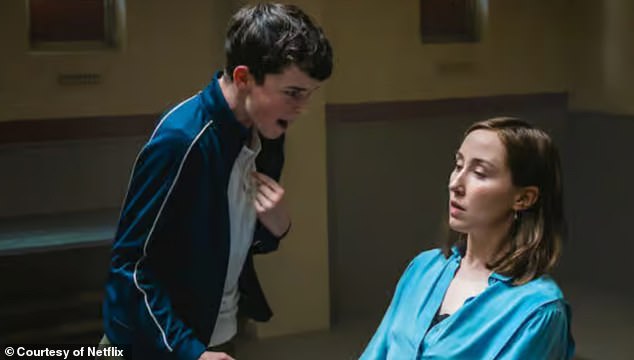
Adolescence’s Owen Cooper as Jamie Miller and Erin Doherty as Briony Ariston
His success has spawned a vast network of acolytes and imitators who spew bile to generate clicks from mostly male followers.
They offer simple answers to complicated questions and have skilfully upended the narrative that masculinity is something to be ashamed of. The eternally virtuous find it very easy to be shocked and appalled by Tate but far harder to admit that, by creating the mindset under which boys are always the problem and never the solution, they are part of the reason he became so popular in the first place.
Wokeness sees men as undeserving champions who need to be knocked off their perch to make room for everybody else. Young men have duly been downtrodden and browbeaten by a society that systematically chides them for exploiting women.
They are bombarded with reasons to feel bad about themselves from the moment they are old enough to kick a ball, if indeed they are predictably boorish enough to want to do that instead of choosing to play with a doll.
Men have become the last remaining demographic for whom ridicule is not only accepted but encouraged. Teachers, politicians and experts glibly demonise their inherently ghastly traits while Hollywood films mock their buffoonery and celebrate their defeat by the flawless girl boss.
Boys are raised to expect that they will inevitably become greedy men who dominate boardrooms and profit from the ‘gender pay gap’. Even middling success in a menial role is probably at the expense of a woman who never got the chance.
The reality, however, is that they find themselves failing in a world they were always told was unfairly weighted in their favour. White working-class boys in Britain have the worst outcomes and lowest expectations by almost every available metric.
The stats are devastating. Men are four times more likely to commit suicide. Boys are more likely to be kicked out of school for bad behaviour, more likely to drop out due to poor grades, and more likely to end up in jail.
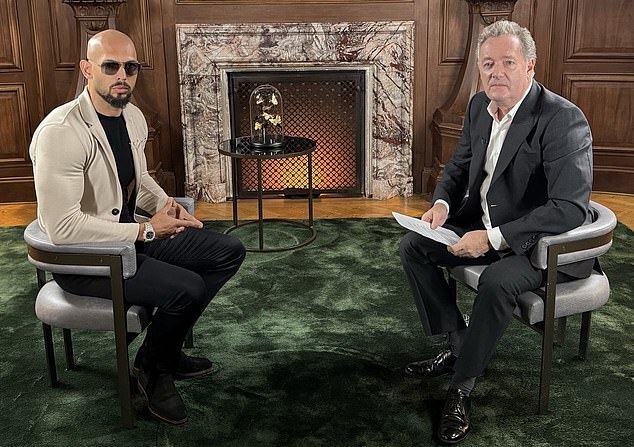
Andrew Tate on Piers Morgan Uncensored in 2023. Morgan describes Tate as ‘sharp, suspicious, intensely focused and belligerently confident’
Young women in full-time work in the UK actually now earn almost 9 per cent more than young men. There will soon be two girls for every male graduate at university in the UK.
We’re now seeing real harm resulting from years of demanding men apologise for who they are. Any other marginalised group with the harrowing outcomes and litany of crises facing young men would be a top priority concern for woke crusaders. But they all got so stuck on the idea that men are responsible for crushing all of the other oppressed groups, that they have simply been left to rot.
Yes, it’s a sad fact that some boys grow up to be appalling men who perpetrate the vast majority of all domestic violence – and worse. But we are more conscious of this than we’ve ever been and the lion’s share of men are repulsed by it.
We should be able to have difficult conversations about male violence and perversion without forgetting that a vast majority of men find it utterly reprehensible. Instead, the relentless societal focus on only the bad guys has become a bitterly ambition-sapping, spirit-crushing pill for young men to swallow. Which is precisely why millions of them tune in to Tate’s podcast and why more young guys stop me in the street to ask about him than anybody I have ever interviewed.
In person, Tate is sharp, suspicious, intensely focused and belligerently confident. He’s the centre of gravity in any room he walks into and capable of being disarmingly charming. I can understand why people are drawn to him.
In his world, classically male traits are not dangerous or shameful but are the essential foundations for lavish success. He sells a beguiling action-packed lifestyle of private jets, fast cars and big cigars with a compulsive dedication to fitness and a gleeful glorification of profit.
Mental health woes on Planet Tate are obliterated by exercising, socialising and succeeding.
Men can take charge of their own destiny – attracting women and accumulating great wealth – with relentless discipline, fortitude and perseverance. Failure is your own responsibility, not everybody else’s, and being weak is, in fact, a weakness.
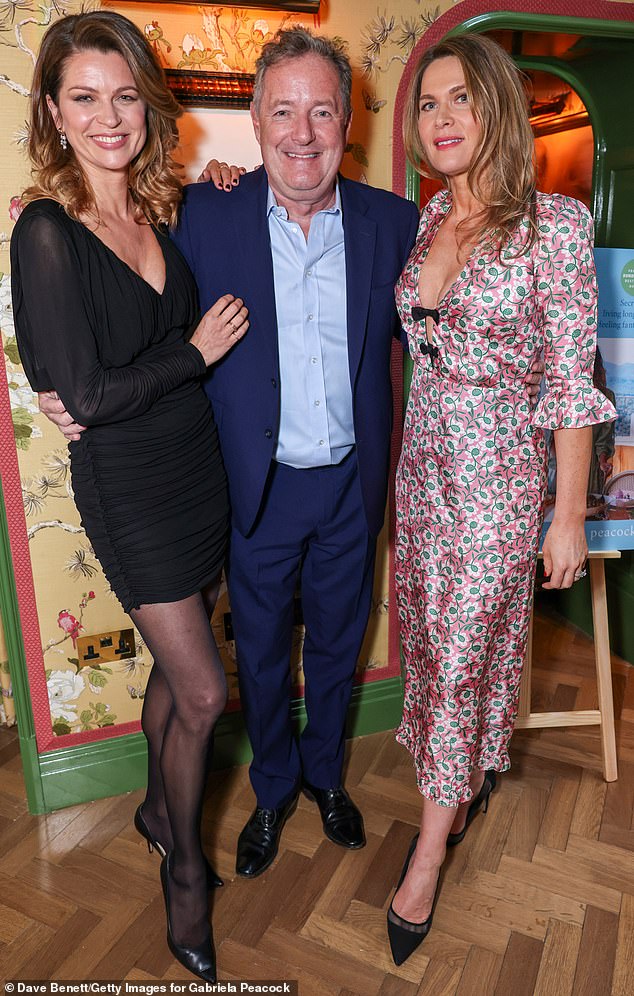
Morgan with Gabriela Peacock, left, and his wife Celia Walden
It’s obviously all very cartoonish, and clearly there are plenty of valid reasons to consider Tate an extremely dangerous messenger, but the fact is there is nothing wrong with any of that part of his message.
There’s also a reason why it sounds good to many young men who have for so long been told that all of these intrinsic desires are repugnant and that they should strive to be precisely the opposite.
The MeToo movement rightly highlighted sexual harassment and abuse of women but it had an absurd by-product – the enforced feminisation of men in popular culture. Hulking, sulking, indomitable action heroes like Rocky, Dirty Harry and Die Hard’s John McClane gave way to an anxiety-ridden Spider-Man and an emasculated James Bond who just wants to sit and talk about his feelings. Action Man has roller blades and a water pistol instead of military hardware.
This insidious indoctrination has been gradually building to a climax for many years now, culminating in a load of gurning male celebrities including Benedict Cumberbatch and Tom Hiddleston vaunting their virtue by wearing T-shirts with ‘This is what a feminist looks like’ emblazoned on them.
There ought to have been a middle ground between expecting men to repress their feelings and eulogising us for vaunting our vulnerabilities and getting pedicures.
Running alongside all of this was persistent hectoring on how male and female traits are simply hammered into us by a society of fossilised dinosaurs.
Boys and girls are really just a big soupy broth of gender fluidity, waiting to be poured into a bowl of their own choosing.
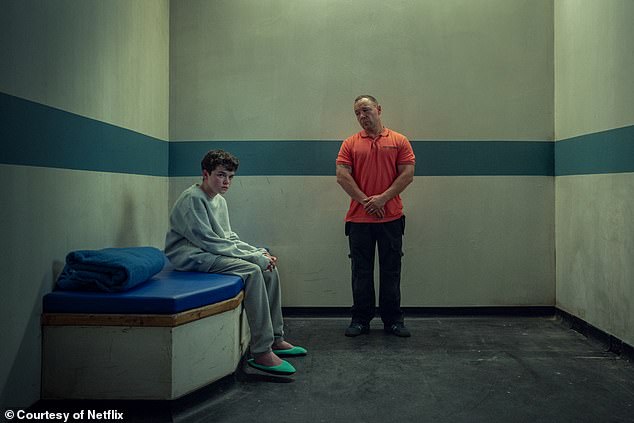
Morgan describes Adolescene as an ‘updated re-telling of the same downbeat story that has dominated culture throughout the woke years’
I have three sons and a daughter, and I can tell you, as any parent can, that girls and boys think and behave differently, they experience emotions differently and they mature differently. Yet it’s become offensive to say it.
But no matter how many times we are sent to the naughty step for our natural urges, men are just not buying it. We are competitive, risk-taking and adventurous. We are ambitious and we want to make money because for thousands of years we have been hunter-gatherers or breadwinners whose natural aggression is of life-and-death importance for the people we most want to protect.
That inherent sense of purpose is what drives a lot of us to get out of bed in the morning and kick ass. Remove it at your peril.
Feminists and man-bun metrosexuals may sneer about ‘Big D**k Energy’ but it sometimes comes in handy when we need men to fight in wars, build a house or squash a spider – often when they’d rather be doing just about anything else.
Judging by the many strong women in my life, they also quite like it when we pick up the bill, hold open the door or lug bags of compost in from the car.
Where Tate and his clones lose me is with their demeaning of women. A wretched subset of the so-called ‘manosphere’ pushes the noxious idea that defending masculinity means asserting male superiority. Celebrating men suddenly lapses into bullying of women and the nonsense idea that stunning women will inevitably swoon over men who follow a simple programme of domineering and chauvinism.
I have grilled Tate on his extreme, dangerous and frankly ridiculous positions, such as claiming women should ‘bear some responsibility’ for sexual assault and that women are male ‘property’ who must ‘obey’. There is no justification for calling women ‘bitches’ and ‘hoes’ or boasting about violence towards women, all of which he has done too many times to count.
However, radical feminist types have tried in vain to poison gentlemanly gestures like holding doors, carrying heavy bags or paying for dinner as some kind of patriarchal power play. They are no such thing. They’re a well-mannered expression of a man’s respect for a woman – and most women appreciate it. The world needs more gentlemen, not fewer, and for me it’s a big part of what real masculinity is.
MeToo, as I’ve said, was an important and necessary movement, but it moved on to terrifying all young men into thinking that expressing an interest in someone they’re attracted to is automatically at high risk of being deemed predatory.
But in this culture of condemning creeps and unwanted advances, I’m prepared to die on the very lonely hill of defending male seduction. Most of us are attracted to beautiful women and like to think we have a shot with all of them. There’s nothing sleazy about fancying women or wanting them to know about it. In fact it’s somewhat fundamental to the continuation of our entire civilization.
Flirting, meeting and mingling – essential ingredients in the recipe for life – have reached a nadir.
Years of chilling warnings about the myriad ways a man can make a woman feel uncomfortable have left many young men too afraid to talk to them, never mind charm them. And the mass migration of young people to dating apps has poured fuel on the flames.
Seducing a woman used to involve social skills and bravery. A man had to summon the courage to chat up a woman, dazzle her with conversation or humour and persuade her that he was worthy of an hour of her attention.
Rejection was always a natural and healthy part of the process and it got easier to handle with a bit of practice, as many of us discovered with more regularity than we like to admit. But young people raised on medals for simply taking part in a competition, mental health days and dating apps have no tolerance for genuine rejection because we’ve given them so many ways of hiding from it. On a dating app the rejection is unseen and instantly forgotten.
People swipe compulsively through a meat market of faces and bodies, making instant judgements based solely on looks. Why risk real-world humiliation and awkwardness when you can just keep on swiping at home? I can see why it’s easy but it’s not how human beings are built to interact.
More than a third of women say they have been approached less often by men since the MeToo movement while close to two-thirds of young men haven’t approached a woman in real life at all in the past year and – staggeringly – almost half of them never have in their entire lives.
Unsurprisingly, roughly the same number of young men are single – which is almost double the number of single young women, many of whom are simply dating older guys who actually have status and money.
An average young man has to approvingly swipe on 1,000 different women to get a date with just one. Women now judge men briskly and brutally, with four out of five of them going for the 20 per cent of men with washboard abs, chiselled jaws and exciting jobs, immediately rendering the vast majority invisible.
And I really can’t blame them because they are fed the polar opposite storylines to the ones used to trample on men.
For women the message is that they can do whatever they want and be whoever they want to be – which is laudable, until it reaches the part which entirely omits male involvement.
The celebration of female potential is now routinely bundled together with the complete erasure of men, as if one can’t possibly succeed at the same time as the other. The grim result is that men in their 20s are far more likely than women to be isolated, bored, sexually dormant and lonely. They age into unattached men in their 30s who are statistically at ever greater risk of lapsing into drug use and crime.
Most men don’t really want to be single, hence ‘involuntarily celibate’ or incel, and they find solace in online communities with similarly aggrieved boys who blame women for denying them pleasure.
Yet, for all the attempts to feminise men by demeaning masculinity and celebrating the fawning or blubbering types, there is no evidence that women actually want it. They want men to chat them up. They still expect men to make the first move because the things they often find most attractive are confidence, humour and the ability to deliver prosperity.
But many men are now scared of making a move because they’re afraid of being smeared as a mini-Weinstein. They have been terrified into thinking that expressing an interest in someone they’re attracted to puts them automatically at risk of being deemed predatory. A third of couples used to meet at work but that number has plummeted because the guys don’t want to be reported to Human Resources as creeps.
The whole notion of sexual energy has been stigmatised as akin to male harassment and violence. We have forgotten that it is mostly a very good thing. Men scale dizzying peaks when they find chemistry with a woman.
The impulse to go out and attract a partner is a massive motivation for men in all sorts of positive ways, including keeping fit and making money. It’s driven by the natural desire to make and protect new versions of ourselves, without which there would be no humans.
Young men haven’t simply bottled up all of this desire and locked it away in the basement. They have mostly locked themselves away in the basement, where they are playing computer games and watching porn. About 30 per cent of all internet traffic is porn and 80 per cent of that is men looking for and watching it.
This is a ruinously vicious cycle that leads to more unrealistic expectations about women and what sex is really like, as well as snuffing out the healthy hunger to go and get it in real life. It’s time to step away from the smartphone and try a bit of flirting again.
Instead of teaching boys they are all predators, we should be teaching them how to approach women in real life with agency, confidence and respect. But we are fighting a rising tide. Social media is really anti-social media because its whole mission is to replace eye contact with screen contact.
In his job as a psychologist, Jordan Peterson listens to thousands of young men, often bereft of role models, and finds them listless and despairing. ‘They have been programmatically demoralised,’ he told me. ‘More demoralisation is not the answer.’ But nor, he says, is Andrew Tate.
‘I wouldn’t hold out much hope for the West if Tate is the direction they go. But if you’re weak, dependent and demoralised by your culture, someone blustery and successful on the surface – aggressive and dominating in the power-mad way that he is – is going to look pretty damn attractive.’
He’s right. Tate and the Tate-a-likes only exist as a bulwark against a culture that tells men their ambition is patriarchal and their desire is predatory. They can only be role models because the real role models have disappeared.
The number of fatherless homes has rocketed in the UK and in the US. The long quest for female representation in male-dominated roles has totally ignored the vital importance of male representation in roles that have the biggest influence on young people. There are now more female military pilots, proportionally, than male nursery-school teachers and more than three-quarters of all UK teachers are women.
Feminism used to be about equal rights and equality, which everybody should support and most who are sensible did, until it became a campaign to proactively kneecap men. As with every aspect of wokery, we are witnessing the unintended consequences and massive backlash to purges that began with perfectly good intentions.
Fembots will roll their eyes and say it’s about time women had their turn on top after their centuries of suffering. But the young men of today had no part in any historic suppression of women and they very clearly are not reaping any benefits from it either.
Love us or loathe us, the world needs men and men need masculinity. But men need to step up. If you don’t like the new breed of boisterous male role models then try being a better one yourself. And look out for each other, because nobody is going to do it for you.
We’ll emerge from the crisis of masculinity by simply encouraging men to do the one thing they can do better than anything without even having to try. Be a man!
Adapted from Woke Is Dead by Piers Morgan (HarperCollins, £22), published October 23 © Piers Morgan 2025. To order a copy for £18.70 (offer valid to October 18; UK P&P free on orders over £25) go to www.mailshop.co.uk/books or call 020 3176 2937.
